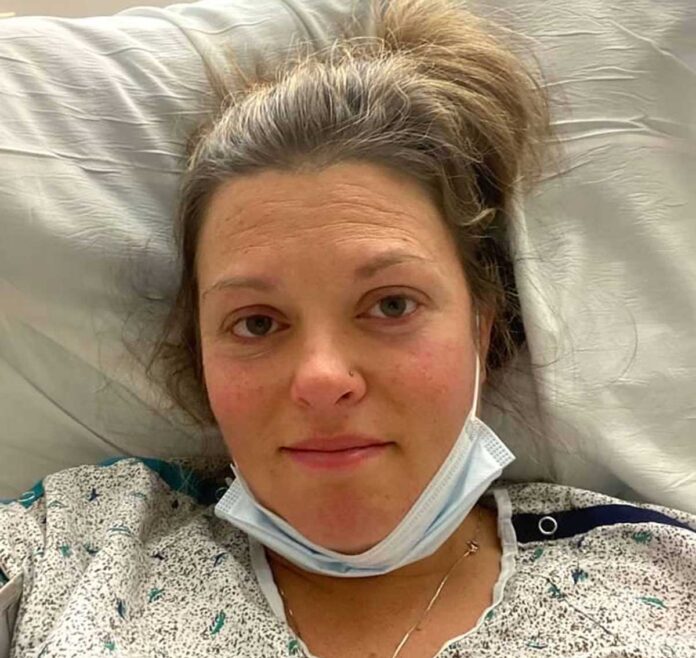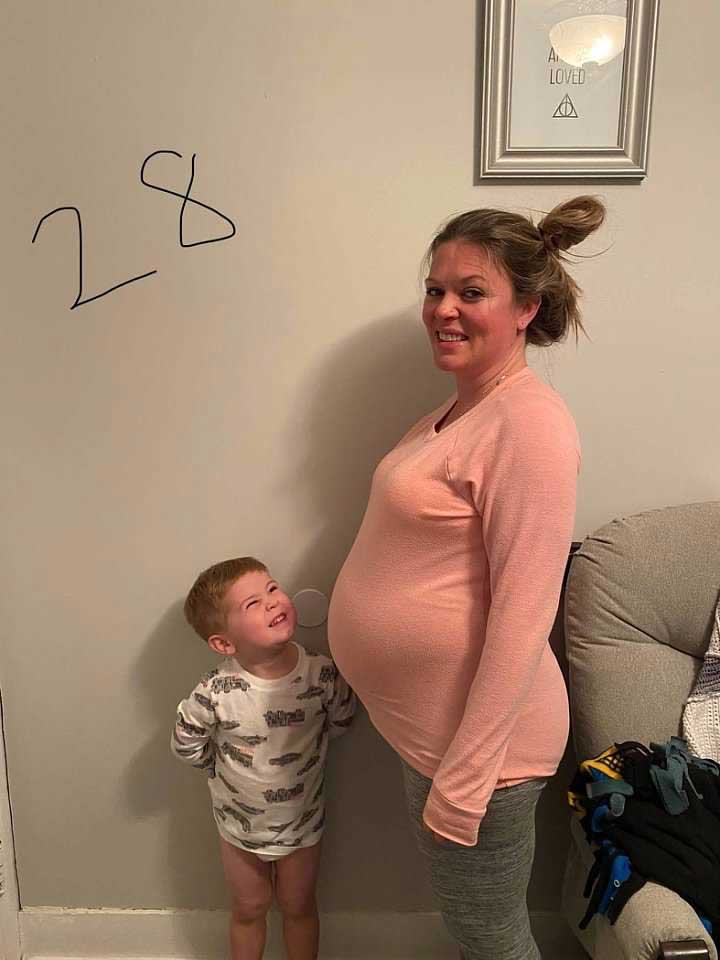
As a two-mom family, we knew welcoming another baby to our lives would have us experiencing some non-traditional sides of pregnancy. But, we had absolutely no idea how unusual this process would actually get.
I’m writing this column from the MOM (Maternal Observation and Monitoring) Unit at Abington-Jefferson Hospital, my new home for the foreseeable future. After our girl, Avery, was diagnosed with intra-uterine growth restriction in August, we’ve known this leg of the pregnancy trip could be coming, but it arrived a lot sooner than we had hoped.
The high-risk docs have been monitoring both Avery’s and August’s cord flow (and growth) weekly for months. Cord flow can be normal, elevated, absent or reverse (the last of which we learned means the blood flow I’m sending to her isn’t being pumped back by her heart — a finding that usually leads to immediate delivery to avoid fetal loss). Avery’s flow had been elevated for months, but we had coasted the last few weeks through appointments where it was staying stable. That changed Nov. 8, at our 28-week appointment, when the sonographer found it had dropped to intermittent reverse flow and the doctors admitted us right away.
While waiting in the triage unit, I told Ashlee I was terrified they were going to tell me I had to stay in the hospital indefinitely, an experience I had read about many times on an IUGR Facebook support group we joined and, lo and behold, a few minutes later, the docs came in to welcome me as the newest resident of their MOM Unit. I spent the first 24 hours (including one where I slept!) hooked up to monitors to track the babies’ heartbeats and oxygen levels, along with constant blood pressure checks because I have also developed pre-eclampsia (which they think is related to placental issues Avery’s having and not just the crazy stress). The 24-hour monitoring has thankfully been reduced to three, one-hour non-stress tests daily, though the blood draws, shots, vitals checks and more seem to still be around the clock. As of now, the doctors are hoping to keep the babies in until week 30 or, ambitiously, week 32 (Dec. 3) but, if my pressure skyrockets again or their heart rates deteriorate, it’ll be go time.
So, here I sit (actually, lay).
Saying goodbye to pregnancy expectations
Even before this latest development, Ashlee and I were coming to terms with the fact that my pregnancy wasn’t going to be like hers. When she was carrying Jackson, we did all the “traditional” things: picked a theme, had a gender reveal party, had a baby shower, I painted his nursery, we excitedly hung things up on the wall and picked out a “coming home” outfit for when he got to leave the hospital.
After adjusting to the news we were having twins early on in this pregnancy, we started down that path. We picked a neutral green for their room and Ashlee got to painting, we got a new rug, we decided on a cute animal theme, we made a registry for twin things we didn’t have left over from Jackson’s baby days, our family and friends started picking dates for sprinkles — and then in August, everything hit the fan and the doctors cautioned us that there was a “very good chance” we’d only be bringing one baby home. The planning stopped, the purchasing stopped, we told our loved ones to cancel the sprinkles and we refused to find out the genders or think about names for weeks. The nursery still contains our spare queen mattress now on the floor, where our dog has taken up residence, with a slew of clothes in stacks along the wall and unhung artwork, while all the twin gear we scoured consignment shops and friends’ houses for is packed up in the basement.
In the months leading up to the birth of a baby (or babies), parents typically dive into the decorating, the organizing, the getting ready — all to envision the next chapter they’re embarking on. But for some parents, that chapter is uncertain, and we, like many others going through pregnancy complications, are stuck in this weird limbo where we can’t let ourselves really envision the babies I’m carrying out of a sense of self-protection from what could happen.
I’m finding that mourning these little aspects of pregnancy — which I didn’t even know were important to me before I couldn’t partake in them — is all about giving up control, which for any parent is likely pretty hard. And it’s exacerbated to the nth degree now that I’m on hospital lockdown. With Ashlee working full-time outside the house (I’m thankfully remote) and in her senior year of nursing school, I’m often Jackson’s primary caregiver. But trapped in the hospital right now, I can’t be the one to pick out his PJs or put him to bed, to tell him when it’s time to shut the TV off, to pack his lunch for school, to find the best toddler tune to amuse him on car rides or to listen to painstakingly detailed stories about his day — all of these were things that frustrated and stressed me just a week ago but that I now wish were still in my control.

Saying hello to help
When you give up control, there’s no other option but to ask for and accept help — likely a foreign concept to most parents, who are conditioned to take charge as part of their job. My first phone call after I found out I was being admitted was to my mom to ask her to get Jackson from school — and from there, both our families sprang into action. My sister set up an online sign-up sheet to make sure Jackson had rides to and from school and that someone would be with him overnights when needed. The grandparents and aunts are all taking turns covering for Ashlee, who spent a few days at the hospital with me but had to go back to work to not use up all the leave she’ll need when the babies do arrive and who still has night classes and weekend clinicals. My best friend came and picked up our dog to give her her own vacation; friends and neighbors are tag-teaming on filling our fridge with food for Jackson and Ashlee; and others have offered all of their streaming service and Kindle passwords to keep me amused here. The immense support we have experienced over the last week has incredibly blown us away and prompted Ashlee and I to have many conversations about how we need to be better people, like the loved ones we have in our life (though that can wait until after these babies arrive — no time for generosity right now!).
Depending on others for help isn’t comfortable but it’s a reality I’m learning to deal with, even when it comes to my own wife. Ashlee is waffling between parent, employee, student and now caretaker, as she’s the only visitor I’m allowed (though I do get 45 minutes a day off my floor to visit with folks in the hospital atrium!) and is getting some hands-on nursing practice changing my compression cuffs and helping me replug all the cords each time I get out of bed. In the meantime, I’m sending her screenshots of the upcoming holiday events I had planned to take Jackson to so she can make sure he still gets there and writing up detailed instructions about how to put up the Christmas lights.
In the past three-plus years, I have managed this whole parenting thing by trying to be in the driver’s seat. Now, I’m entirely a passenger — and a super-incapacitated one at that — and it’s a whole new, deeply unsettling experience. But it’s one that has made me grateful beyond words for the love we have in our lives, tremendously empathetic for those who aren’t as lucky as we are to have such a circle and slightly more confident about the likely NICU journey we’re about to embark on, knowing that we have such strong support.
There have been so many moments throughout our parenting journey these last few years that have shown me that, no matter how hard you may try to control things when you’re raising kids, the universe can always turn things on their head and you have to be prepared to be unprepared. I’ve never felt that more acutely than last week, and I have a feeling that lesson is going to be one that keeps on giving in the coming weeks. So, from here on out, it’s all in the universe’s hands.